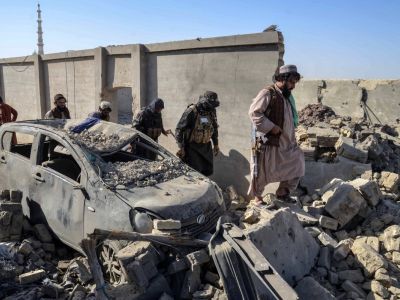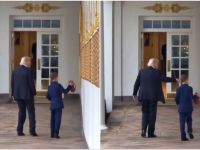With America’s war in Afghanistan entering a critical stage, new reports are emerging on how US oil companies apparently pushed for US policies that shielded international terrorists and promoted the Taliban militia – at least for as long as they seemed useful.
Two French intelligence analysts have taken the lead in cracking this case, claiming that
US President George W. Bush, under pressure from oil companies, initially blocked American investigations into terrorism, while it bargained with the Taliban for the delivery of Osama bin Laden in exchange for political recognition and economic aid.
FBI Deputy Director John O'Neill resigned in July in protest over the obstruction, say the authors of Bin Laden, la verite interdite (Bin Laden, the Forbidden Truth), according to a report by Inter Press Service Online.
“The main obstacles to investigating Islamic terrorism were US oil corporate interests and the role played by Saudi Arabia in it,” O'Neill reportedly told Jean-Charles Brisard and Guillaume Dasquie, whose book has been released in Paris.
In fact, the peculiarities of America’s ties with the fundamentalist militia have registered on more than one radar screen.
Capitalism Magazine Online has reported that the Bush continued a Clinton-era policy and committed more than $100 million in foreign aid to Afghanistan – making America, as it pointed out, the world’s largest humanitarian donor to a regime almost universally condemned for massive human rights abuses.
In May, before the US had an inkling of Black September, Secretary of State Colin Powell announced an additional $43 million in relief, including 65,000 tons of wheat, vegetable oil, blended foods, health programs and shelter, added the magazine.
The two French authors claim the US government's main objective in Afghanistan prior to Black Tuesday was to consolidate the position of the Taliban regime in order to obtain access to the enormous oil and gas reserves in Central Asia.
Brisard and Dasquie apparently have no problem deciphering the complicated Bush-Taliban relationship, maintaining that until August, Bush saw the Taliban regime “as a source of stability in Central Asia that would enable the construction of an oil pipeline across Central Asia,” from the bountiful oilfields in Turkmenistan, Uzbekistan, and Kazakhstan, through Afghanistan and Pakistan, to the Indian Ocean.
Until now, according to the authors, “the oil and gas reserves of Central Asia have been controlled by Russia. The Bush government wanted to change all that.”
The standpoint that big oil plays a huge role in the region is supported by CBS News correspondent Tom Fenton, who spent considerable time based in Turkmenistan, where he ran into the expanding US petro-interests.
“The oil companies needed a stable and friendly regime in Afghanistan to make a deal with. So America quietly supported the Taliban, and with the connivance of Pakistan, helped these new fundamentalists fight their way to power,” according to the CBS correspondent.
The Bush administration began to negotiate with the Taliban immediately after coming into power in February, and US and Taliban diplomats met several times in Washington, Berlin and Islamabad, according to Brisard and Dasquie.
To polish their image in the US, the Taliban even employed an American PR expert, Laila Helms. The authors claim that Helms is also an expert on the US intelligence services, since her uncle, Richard Helms, is a former CIA director.
However, confronted with Taliban's refusal to accept US conditions in the oil field, “this rationale of energy security changed into a military one,” claims the book by the French authors.
“At one moment during the negotiations, the US representatives told the Taliban, 'either you accept our offer of a carpet of gold, or we bury you under a carpet of bombs',” according to Brisard.
Bush's family has a strong oil background, notes the book, which also numbers Vice President Dick Cheney, National Security Council director Condoleeza Rice, and the secretaries of commerce and energy, Donald Evans and Stanley Abraham, as longtime allies and associates of big oil companies.
Cheney was until the end of last year president of Halliburton, a company that provides services for the oil industry; Rice was between 1991 and 2000 manager for Chevron; while Evans and Abraham worked for Tom Brown, another oil giant, say the authors.
The book confirms earlier reports that the US government worked closely with the United Nations during the talks with the Taliban.
“Several meetings took place this year, under the arbitration of [the] personal representative of UN Secretary General Kofi Annan, to discuss the situation in Afghanistan,” according to the authors.
“Representatives of the US government and Russia, and the six countries that border with Afghanistan were present at these meetings,” it says. “Sometimes, representatives of the Taliban also sat around the table.”
Naif Naik, former Pakistani minister for foreign affairs, confirmed that the meetings took place during a recent French television news program, according to Inter Press.
Naik said that during one such meeting in Berlin in July, the discussions focused on “the formation of a government of national unity. If the Taliban had accepted this coalition, they would have immediately received international economic aid.”
“And the pipe lines from Kazakhstan and Uzbekistan would have come,” he added, cited by the news agency.
Naik also asserted that Tom Simons, the US representative at these meetings, openly threatened the Taliban and Pakistan.
“Simons said, 'either the Taliban behave as they ought to, or Pakistan convinces them to do so, or we will use another option'. The words Simons used were 'a military operation',” Naik claimed.
With US special forces on the ground in Afghanistan, and the Taliban retreating in the face of a large-scale American “military operation,” the next question is: Did Bush see Black Tuesday as a tragedy or an opportunity?
© 2001 Al Bawaba (www.albawaba.com)









